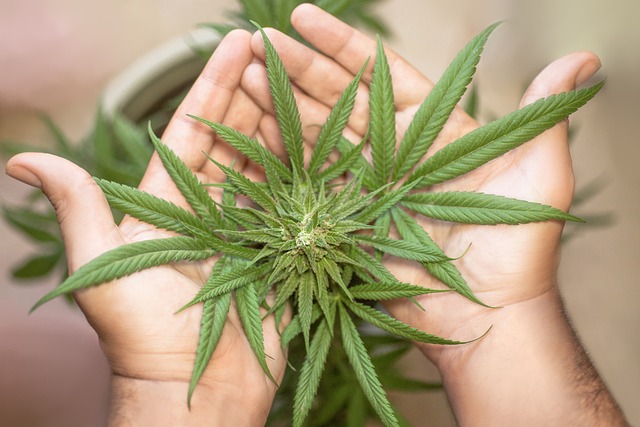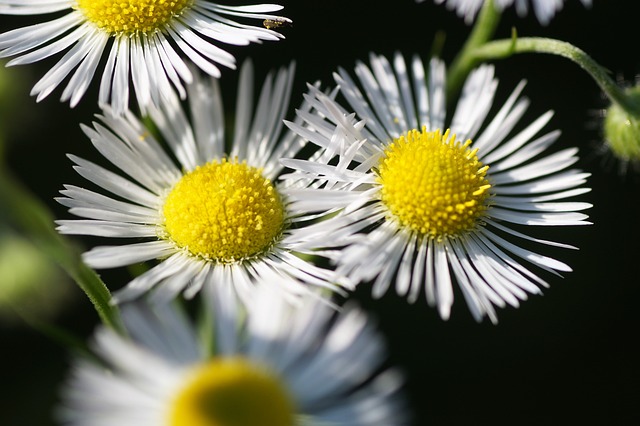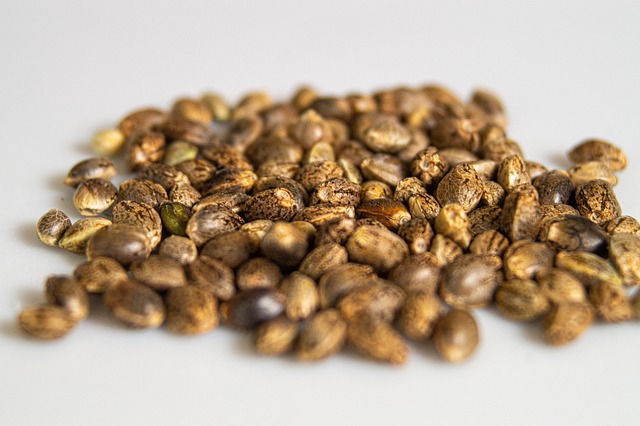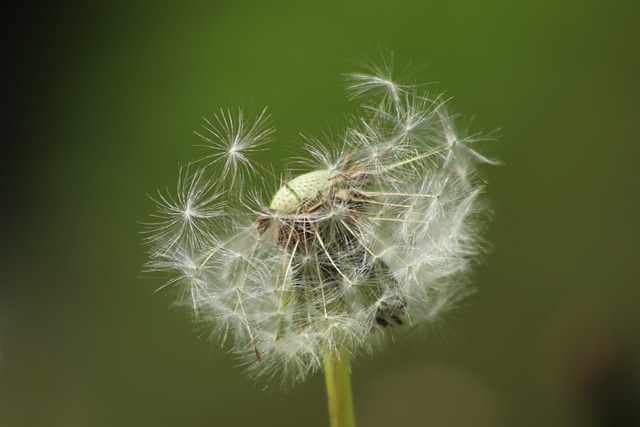Texas legally recognizes THCA (Tetrahydrocannabinolic Acid) as a non-psychoactive cannabinoid with significant potential for health benefits. It is sanctioned within the Texas Compassionate Use Program for medical use under strict regulations, including a cap of less than 0.5% Delta-9 THC by dry weight. The 2018 Farm Bill further allows for hemp-derived THCA possession, cultivation, and sale if THC levels remain below 0.3%. THCA's legal status in Texas is clear but requires careful adherence to avoid infractions. It's a key component of the entourage effect and offers therapeutic benefits such as anti-inflammatory and neuroprotective properties without intoxicating effects, making it an attractive option for those seeking medical relief within the state's regulated cannabis market. As legal landscapes evolve nationally, THCA's role in health and wellness continues to be a focus of research and clinical trials, highlighting its therapeutic promise and importance in cannabis therapy.
Explore the multifaceted world of THCA flower, a non-psychoactive powerhouse gaining momentum in Texas. As we delve into its legal standing within the state, ‘THCA Flower and Its Legal Status in Texas: A Comprehensive Overview’ provides clarity on its regulatory status. Understanding the intricate chemistry behind this compound is the focus of ‘The Chemical Compound THCA: A Deep Dive,’ elucidating why THCA is a subject of intense interest. The entourage effect, which amplifies cannabis’s therapeutic benefits, is decoded in ‘Understanding the Entourage Effect: How THCA Contributes to Cannabis Benefits.’ With Texas dispensaries increasingly offering THCA flower, ‘The Rise of THCA Flower in Texas Dispensaries’ charts its emergence. For those curious about cultivation, ‘Cultivation and Harvesting: Growing High-Quality THCA Flower in Texas’ offers insights. The potential healing attributes of raw THCA are explored in ‘The Potential Therapeutic Properties of Raw THCA.’ As consumption methods vary from smoking to edibles, ‘Dosing and Effectiveness: Navigating the Right Amount of THCA Flower’ guides users through safe practices. Legal considerations, economic implications, and comparisons to other states are addressed in the subsequent sections. ‘Safety, Side Effects, and Who Should Avoid THCA Flower’ ensures informed decisions. Lastly, real-life experiences shared in ‘Consumer Testimonials: Real Experiences with THCA Flower in Texas’ provide a personal touch to the discourse on THCA’s legal status in Texas.
- THCA Flower and Its Legal Status in Texas: A Comprehensive Overview
- The Chemical Compound THCA: A Deep Dive
- Understanding the Entourage Effect: How THCA Contributes to Cannabis Benefits
- The Rise of THCA Flower in Texas Dispensaries
THCA Flower and Its Legal Status in Texas: A Comprehensive Overview

Texas has a unique stance on the legal status of THCA flower, which is the raw, non-psychoactive form of tetrahydrocannabinol (THC), the primary psychoactive component of cannabis. Unlike its psychoactive counterpart, THCA is found in raw cannabis plants and possesses a distinct set of potential wellness benefits without the intoxicating effects associated with THC. In Texas, the legal framework surrounding THCA flower is governed by the state’s Compassionate Use Program (CU Program), which allows for the use of low-THC cannabis for medical purposes under a physician’s recommendation and the registration of the patient in the program. This legislation has led to a growing understanding and acceptance of cannabinoids like THCA, as long as they adhere to state regulations. It’s important for consumers to be aware that while THCA itself is legal within the confines of the CU Program, any processing or conversion of THCA into THC, which alters its legal status, is strictly prohibited in Texas. As such, individuals interested in utilizing THCA flower must do so in compliance with the state’s guidelines to avoid unintentionally violating cannabis laws. The legal landscape for THCA in Texas continues to evolve, with ongoing discussions and potential policy changes reflecting the broader national conversation on cannabis reform. Stay informed about the most current regulations to ensure compliance with state laws regarding THCA flower.
The Chemical Compound THCA: A Deep Dive

Delta-9-tetrahydrocannabinolic acid, commonly known as THCA, is a naturally occurring cannabinoid found in the Cannabis sativa plant. While THCA is non-psychoactive, it is the precursor to the more well-known psychoactive compound THC, which forms when THCA is exposed to heat or light through a process called decarboxylation. As of the knowledge cutoff in 2023, THCA’s legal status in Texas is nuanced, reflecting the broader regulatory landscape of cannabis products in the United States. In Texas, the cultivation, possession, and sale of hemp-derived THCA are permissible under the 2018 Farm Bill, as long as the THCA contains less than 0.3% delta-9-THC on a dry weight basis. This distinction is crucial for consumers and businesses operating within the state’s boundaries, as it differentiates between legal and federally illegal cannabinoids. The interest in THCA stems from its potential therapeutic properties, which include anti-inflammatory, neuroprotective, and anti-nausea effects, without the psychoactive ‘high’ associated with THC. As research continues to evolve, so too does the understanding of how THCA interacts with the human endocannabinoid system, offering insights into its potential roles in health and wellness.
Understanding the Entourage Effect: How THCA Contributes to Cannabis Benefits

delta-9-tetrahydrocannabinolic acid (THCA) is one of the most prominent cannabinoids found in the cannabis plant and holds significant relevance within the context of the entourage effect. This effect denotes the enhanced therapeutic properties that arise from the combined action of all the cannabinoids, terpenes, flavonoids, and other elements present in cannabis. In states where THCA is legal, including Texas, researchers have explored its potential benefits without the psychoactive effects associated with its decarboxylated form, THC. THCA’s non-psychoactive nature allows users to experience the plant’s wellness effects legally and safely in regions like Texas. Preliminary studies suggest that THCA may offer anti-inflammatory, anti-nausea, anti-anxiety, and neuroprotective benefits, contributing to cannabis’s broader therapeutic profile. The entourage effect is a testament to the synergistic interaction between these compounds, where each component modulates the others’ effects, potentially enhancing the desired outcomes while minimizing adverse reactions. Understanding how THCA interacts within this complex matrix can provide valuable insights into optimizing cannabis-based treatments for various conditions, a subject of growing interest in both scientific and medicinal communities. As legal landscapes evolve, such as with THCA in Texas, the potential applications and benefits of this cannabinoid continue to be an area of active research and clinical exploration.
The Rise of THCA Flower in Texas Dispensaries

Texas has seen a significant shift in its cannabis landscape with the emergence of THCA (Tetrahydrocannabinolic Acid) flower as a popular product in dispensaries across the state. Unlike its psychoactive counterpart, Delta-9 THC, THCA is non-intoxicating and offers potential health benefits without the psychoactive effects that are typically associated with cannabis consumption. This has made it particularly appealing to a wide range of consumers, including those who may be sensitive to or wish to avoid the “high” caused by Delta-9 THC.
The legal status of THCA flower in Texas is defined by the Texas Compassionate Use Program (TCUP), which allows the use of low-THC cannabis for medical purposes. The legislative framework distinguishes between THC and THCA, deeming THCA as legal so long as it contains less than 0.5% Delta-9 THC by dry weight. This distinction has enabled Texas dispensaries to offer a variety of THCA products, including raw flower, which has led to an increase in consumer interest due to its versatility and the ability to infuse it into various products. As a result, dispensaries have reported a rise in sales for THCA flower, with customers valuing its potential therapeutic properties and the legal clarity provided by the TCUP regulations. This trend underscores the evolving market for cannabinoids and reflects the growing demand for cannabis-derived products that cater to diverse consumer needs within the state’s regulatory framework.
2023 has seen a significant shift in the legal landscape regarding cannabinoids, particularly in Texas where THCA flower has become a topic of great interest. As this article has explored, from its legal status to its role within the entourage effect, the implications of THCA are far-reaching. Texas dispensaries have embraced this non-psychoactive compound, offering consumers an alternative that aligns with state regulations on cannabis products. The emergence of THCA flower in Texas underscores a growing acceptance of cannabinoids for their potential wellness benefits and has paved the way for further exploration into their therapeutic properties. For those curious about the legalities and science behind THCA, this article provides a thorough examination, ensuring that readers are well-informed on this evolving subject within the realm of Texas’s cannabis legislation.
